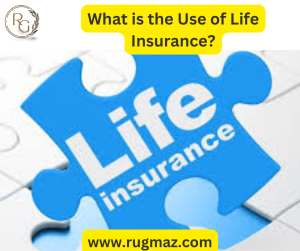What is the Use of Life Insurance?
If you aren’t sure how life insurance works, read on to find out the many benefits of purchasing a policy. Then, learn about the cost, beneficiaries, and how to invest in this type of insurance policy. You’ll be glad you did when you read about the many benefits of life insurance. After all, it’s a way to ensure that your family has a secure financial future.
This way, your loved ones will not have to worry about their mortgage payment, college tuition, or other expenses.

Benefits
The main benefit of life insurance is that it provides a death benefit to your family, which can be used for whatever your loved ones need. The policy can be purchased anytime, not just when something happens in your life. Term life insurance offers a guaranteed death benefit and level premiums for the term of the policy. Permanent life insurance offers stronger guarantees and the option to accumulate cash value. Here are three reasons why you should get a life insurance policy.
First of all, a life insurance payout is a tax Your policy payouts are not income for tax purposes, so your family will never be left in debt. Furthermore, your estate will pay off any outstanding debts you accumulated throughout your life. For example, if you had a joint credit card account, your spouse will now pay off the debt. If you were a cosigner on a loan, your estate will take care of the rest.
Another benefit of life insurance is its tax cash payout to your loved ones. You can use the death benefit to settle credit card debts or contribute to your partner’s retirement fund. Life insurance has become an essential part of most people’s finances. However, a life insurance policy is not meant to replace traditional retirement accounts. It’s more of an asset than a retirement account. The most important advantage of life insurance is financial protection.
Life insurance has many advantages. It pays off debts, covers funeral costs, and provides a living benefit. It also lets you take out loans against the cash value of your policy. While you can use your policy’s cash value for other purposes, it’s not considered as income for federal financial aid purposes. Aside from cash value, it provides peace of mind. A death benefit can cover the expenses of a loved one’s family.
Cost
The cost of life insurance depends on several factors, such as the type of coverage you want and the age of the applicant. You can also increase the cost of coverage by adding riders or higher death benefits. Smoking has also been shown to negatively impact mortality rates. Some occupations are high-risk, and your insurer will raise your rate accordingly. Listed below are some of the factors that affect the cost of life insurance. However, it is important to know that every person is different, and your policy might differ based on your own risk factors.
Whole life insurance is more expensive than term life insurance, but a healthy 30-year-old man will pay approximately $571 per month for a policy. However, the price of life insurance depends on age, gender, and lifestyle factors. Women pay less than men do, and their average lifespan is longer than men. For this reason, young people should consider purchasing whole life insurance while they are healthy. However, it is important to note that whole-life premiums can range anywhere from $250 per month to over $1,500 per month.
The cost of life insurance is not the same for everyone. It can vary significantly based on your age and gender. Life insurance companies will set rates based on a number of factors, including the type of policy you choose, the amount of coverage you need, and your health. Insurers cannot discriminate based on your race orientation, or ethnicity. You can also compare life insurance rates by using the policy types on the Policy genius marketplace.
Beneficiaries
The beneficiary clause in your life insurance policy determines who gets the proceeds when you die. The beneficiary clause in your life insurance policy can be flexible. For example, you can name your spouse as the primary beneficiary or your children as the next-of-kin. However, if you are divorced, the beneficiary clause must be changed to specify your children. It is also important to note that you may be able to name your stepchildren as beneficiaries.
Unless you have a will, naming someone as your beneficiary is a good idea. Using a beneficiary clause is important for tax reasons. It ensures that the policy benefits are distributed as intended. Similarly, naming your common-law spouse as a beneficiary should be simple. If you choose a common-law spouse, you should make sure that the beneficiary clause explicitly states that he/she is your spouse.
To find a life insurance policy, begin by asking friends and relatives who may have a policy. If you knew the deceased well, they may have already talked about life insurance with you. You can also speak to financial advisors, as they may have had experience with life insurance policies. Then, make sure you have all of the necessary documents, including the death certificate and the policy number. You can use these documents to file your claim with the insurance company and have the money distributed to the beneficiaries.
Aside from ensuring your beneficiaries are compensated correctly, the beneficiary also has the right to inspect documents that are used in the denial of the claim. Failure to do so will leave the beneficiary to accept the insurer’s denial as the final word. Insurers should be honest and transparent about the documents they used when they denied your claim because it might affect your case. And, of course, if your claim is not approved, you have the right to ask for copies of the documents used in the denial.

Investing in life insurance
Investing in life insurance is not for the faint of heart. Financial experts such as Dave Ramsey and Suze Orman warn against it. Although life insurance companies don’t use excessive leverage, it is still important to consider the risk involved. For example, a bank with $1 million in cash can loan $10 million to the public, which creates instability and risk. The same applies to life insurance companies. So, if you’re considering investing in life insurance, be sure to research the different types and their risk and rewards.
The most important benefit of life insurance is its tax advantages. It helps you protect your beneficiaries and can provide you with peace of mind in the event of a major accident or illness. Besides the peace of mind that it provides, it also generates tax income. Keep in mind, however, that tax exemptions may be limited, so you must check with your financial planner before investing in life insurance. If you can afford it, you’ll be glad you did.
If you want to profit from your investment, life insurance may not be the best choice. The average annual profit yield of life insurance premiums is 0% to 1%. This makes it less profitable than most other categories. If you’re on the younger side of the investing spectrum, you might be able to invest in something more profitable. If you’re already near retirement age, consider investing in other investments. You might be able to receive dividends for your premiums and benefit from other financial strategies.
The downside of whole life insurance is that it has a negative return for five to fifteen years, which is often up to 30 years if you buy a terrible policy. However, if you’re looking for a long-term investment, whole life insurance is an “ok” choice. Most people invest in other financial products because they have more flexibility in choosing which one to purchase. So, what should you invest in?
Cash value component
Many permanent life insurance policies have a cash value component. These policies act like a dedicated savings account that accumulates interest during the policyholder’s lifetime.
Customers can access the cash value account at any time through loans. The following explains the basics of cash-value life insurance. Just like any other life insurance, cash-value life insurance pays out a death benefit to the policyholder’s beneficiaries. The cash value of the policy can be used for anything from paying off policy premiums to purchasing retirement funds.
A life insurance policy with a death benefit of $25,000 has a cash value of $5,000. There have been no prior cash withdrawals or loans on the policy. The money that accumulates in the cash value of the policy becomes the insurer’s property. This means that if you die today, the insurer will only owe $20,000 (i.e., $25,000 – $5,000). Despite the advantages of cash-value insurance, you shouldn’t purchase a policy that doesn’t have cash value.
A cash-value life insurance policy is a valuable investment. A portion of your premiums can be deposited into a cash savings account that can earn interest and potentially save you tax money. Some cash-value life insurance plans allow policyholders to make withdrawals of funds for personal expenses. However, be aware that this can reduce the death benefit. Therefore, be sure to compare cash-value insurance plans to your own financial situation before making a decision.
The cash value benefit of a whole life insurance policy is a special type of policy. It adds a savings account component to the policy and allows policyholders to accumulate a cash reserve for future premiums. A policyholder can withdraw cash value from their cash account or take a loan against the cash value if necessary. However, the cash value component of a policy is usually limited to a living benefit, so loans against it will reduce the death benefit if the policyholder dies before the death benefit is reached.


At the beginning, I was still puzzled. Since I read your article, I have been very impressed. It has provided a lot of innovative ideas for my thesis related to gate.io. Thank u. But I still have some doubts, can you help me? Thanks.
Very nice post. I just stumbled upon your blog and wanted to say that I’ve really enjoyed browsing your blog posts. In any case I’ll be subscribing to your feed and I hope you write again soon!